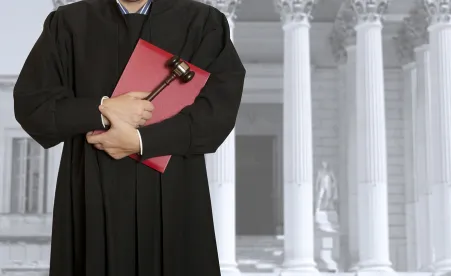In Gapinski v. Gujrati, 2017 IL App (3d) 150502, the Illinois Appellate Court addressed several important issues. Of particular note, however, is the court’s finding that the trial court had discretion to prohibit lawyers representing two different defendants from giving opening and closing statements and questioning witnesses. This is a troubling finding, because it could prevent a party from being represented at trial by an attorney of his or her own choosing. The court based its decision on the presumption that in a medical malpractice case the interests of a physician and his or her employer are identical, which is not always true.
Background
Gapinski involved allegations of a misdiagnosis of metastatic cancer against a pathologist and the pathologist’s employer. The facts of the case are complicated, but only those relevant to this article require discussion.
The plaintiff filed suit in February 2011 against the pathologist and her employer. From February 2011 until February 2014, the pathologist and her employer were jointly represented by the same law firm. In February 2014, approximately four months prior to the start of trial, the pathologist sought to be represented by a different law firm. The employer would continue to be represented by the previous law firm. The reason the pathologist sought to substitute attorneys is not stated in the opinion.
The plaintiff objected to the motion to substitute attorneys because it was filed close to the start of trial and raised the “potential adverse consequences substitution of counsel would have on the trial date.” However, there is no indication that the pathologist or her new lawyer sought to delay the trial date.
Later, the plaintiff asked the trial court to allow the new lawyer to be substituted on behalf of the pathologist, but that the trial court require “the defense attorneys to take turns or alternate questioning witnesses and allow[] only one of them at a time to represent the defendants.” The trial court agreed with the plaintiff. The trial court allowed the new lawyer to be substituted, but ordered that either the pathologist’s attorney or the employer’s attorney could give the opening statement, closing argument, and question each witness, but not both.
At trial, the jury found in favor of the plaintiff and awarded her nearly $2 million in damages. The defendants filed an appeal as to this issue, among others.
Appellate Court: No Reversible Error in Limiting Representation at Trial
The appellate court found the issue to be “whether the trial court erred when it barred [the pathologist] and [her employer] from dual representation.” The defendants argued that by barring the attorneys for each defendant from actively participating in the trial, the trial court limited counsel for each defendant to representing his client only half the time. Further, each time a defense attorney was participating in the trial, he was expected to represent the interests of the other defendant, a non-client.
In short order, the appellate court found that the trial court had discretion to limit representation as it did. First, the court pointed out that the case had been pending for three years before the motion to substitute attorneys was filed, and the trial was scheduled to start in just four months. For this reason, the appellate court found that the trial court “arguably” could have denied the motion to substitute outright. The court referenced the plaintiff’s concerns of “potential” adverse consequences on the trial date. But, there is no indication that anyone actually sought to delay the trial date.
The appellate court then moved on to the trial court’s finding that allowing both defense attorneys to participate at trial would be redundant and unnecessary. The plaintiff’s claim against the employer was solely for vicarious liability, i.e., liability for the acts of an employee. For this reason, the appellate court found the defendants had a “commonality of interests,” and therefore, the defendants were not prejudiced by the trial court limiting their representation at trial.
Justice Carter wrote a concurring opinion that addressed this issue in more detail, agreeing that the trial court did not abuse its discretion. The theme of his concurring opinion was that the defendants’ “litigation interests [were] nominally the same” or even that the parties had “identical interests.”
Justice Carter pointed out the trial court’s concern with protecting witnesses from unduly confusing and excessive questioning and repetitive arguments. Based upon a trial court’s power to control trial procedure, Justice Carter found that a trial judge may “split examination of witnesses and divide the opening statements and closing arguments between counsel for separately represented defendants with identical interests.”
The Plaintiff Chooses Which Parties to Sue, and Those Parties Sued are Entitled to be Represented by the Lawyer of Their Choice
The Illinois Appellate Court has repeatedly recognized that when a plaintiff chooses to sue multiple defendants, each defendant is entitled to present an expert witness in his or her own defense. This is true even if the multiple expert witnesses also support the defense of co-defendant physicians. Taylor v. County of Cook, 2011 IL App (1st) 093085, ¶ 36; Tsoukas v. Lapid, 315 Ill. App. 3d 372, 383 (1st Dist. 2000). For instance, if two anesthesiologists were sued by the plaintiff, each would be entitled to present its own expert witness, even if each of the expert witnesses supported the defense of the co-defendant anesthesiologist.
The same principle should have applied in Gapinski. The plaintiff chose to sue both the pathologist and her employer, so each was entitled to present its own defense through its own attorney. The plaintiff could have chosen to sue just the pathologist or just her employer, but did not. Apparently, the plaintiff saw a benefit in suing both the pathologist and her employer, and the plaintiff should have been prepared for whatever drawbacks accompanied that decision.
Unless a Continuance was Sought, the Timing of the Request to Substitute Attorneys Should Have Been Irrelevant
In Gapinski, the court focused on the timing of the motion for substitution – three years into the litigation and about four months before trial – as a justification for the trial court’s decision because “[a]rguably, the trial court would have been within its discretion to deny [the pathologist’s] motion to substitute outright.” However, this focus is misplaced because the appellate court did not mention any prejudice the plaintiff would have suffered. The court discussed the plaintiff’s concern about “potential adverse consequences substitution of counsel would have on the trial date,” but there is no indication that the substituting attorney ever asked to continue the trial date. In fact, after the substitution was allowed, the trial apparently proceeded as scheduled.
Gapinski fails to take account of the direction provided by the Illinois Supreme Court in Sullivan v. Eichmann, 213 Ill. 2d 82 (2004). There, the Supreme Court recognized the “established right of a party to discharge his attorney at any time with or without cause, and to substitute other counsel, for a client is entitled to be represented by an attorney in whose ability and fidelity he has confidence.” The Supreme Court found that the only limitation on this right is where substitution would “unduly prejudice” the other party or “interfere with the administration of justice.”
In Sullivan, the plaintiff had missed several discovery deadlines and a deadline for disclosing expert witnesses. The defendant physician then moved for summary judgment because the plaintiff had no evidence of a violation of the standard of care. It was not until the hearing on this motion for summary judgment that the plaintiff sought to substitute a new attorney, at which time the trial court denied the request. The Supreme Court ultimately found that the trial court abused its discretion in denying substitution of counsel, even though doing so required delay of hearing on the physician’s. The Supreme Court found it was abuse of discretion to deny the plaintiff representation by an attorney in whose “ability and fidelity” she had confidence.
Based on Sullivan, the substitution of counsel in Gapinski should have been allowed generally. The Gapinski court detailed no prejudice to the plaintiff or delay in the administration of justice. Therefore, the pathologist had the “right . . . to discharge [her] attorney at any time with or without cause, and to substitute other counsel . . . in whose ability and fidelity [s]he ha[d] confidence.”
The Interests of a Defendant Physician and a Defendant Employer are Not Always Identical, Especially in a Medical Negligence Case
The decision in Gapinski was based in large part on the assumption that the pathologist and her employer had identical interests because this was a vicarious liability claim, and therefore, neither was prejudiced by being forced to be represented by the other’s attorney. Oddly, the court did not consider that sometimes a physician and her employer may have very different interests at trial, especially in a medical malpractice case.
A physician has distinct interests when sued for medical malpractice. An adverse settlement or verdict for the plaintiff can harm the physician’s reputation. It also requires reporting to the Illinois Department of Financial and Professional Regulation and the National Practitioner Databank, which can adversely impact a physician’s licensure or result in other penalties. Therefore, a physician typically has a distinct interest in vigorously defending his or her care.
While a physician’s employer is also typically interested in strongly defending the physician, the employer also must consider the interests of the organization itself. For instance, in a high-profile case or one with significant damages, the employer may wish to settle or focus heavily on limiting damages at trial if the case presents financial or reputational risks to the organization. Similarly, a defendant physician and his partners may disagree about whether a case should be settled or defended.
However, the Gapinski court did not consider these scenarios, which are not uncommon. Instead, the court found that the pathologist and her employer necessarily had identical interests, and based upon this incorrect assumption, the court took away the pathologist’s right to choose her own attorney.
Recommendations
Gapinski is a concerning decision for physicians, hospitals and all other health care providers. Until it is reconsidered or overturned, though, some considerations should be taken into account. First, if the defense of a physician and employer is to be split, this should be done as early in the litigation as possible to eliminate any concerns with a substitution of counsel close to trial. Additionally, the Gapinski court made clear that the issue is left to the trial court. Therefore, if the defendants can persuade the trial court to allow each attorney to represent his or her own client fully, that decision will not be reversed on appeal.




 />i
/>i

